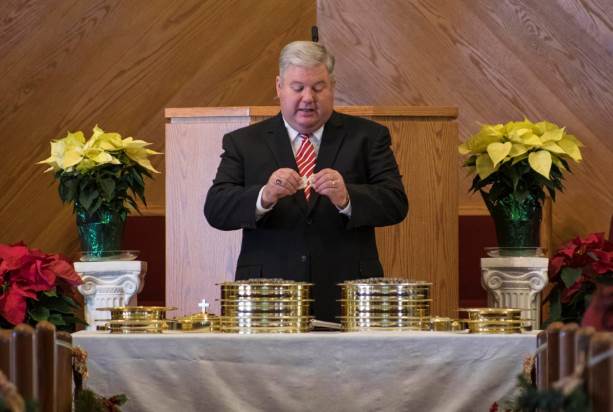Presbyterianism and Admission to the Lord’s Supper


I’m still working on getting acquainted with my new context here in Australia. There’s a lot to learn! I’m keen to pick up whatever I can about the church history in this vast land. That led me to the autobiography of J. Graham Miller, A Day’s March Nearer Home. Now to be clear, Miller was actually a Kiwi, but he did spent a lot of his ministry years in Australia, and eventually retired here as well. Miller was a Presbyterian, eventually affiliated with the Presbyterian Church of Australia. The editor of this autobiography was Iain Murray, who has also served in the Presbyterian Church of Australia.
In chapter 11, Miller reminisces about growing up in a Presbyterian manse in New Zealand. His father, a Presbyterian minister, was quite strict in his beliefs about who should be admitted to the Lord’s Supper. This was in the 1920s. Graham Miller shared his father’s view. At this point, Iain Murray (the editor) adds an explanatory footnote:
It needs to be understood that in Presbyterian churches the Lord’s Supper was only open to communicant members. Only as regard for church discipline declined or disappeared was admission to the Lord’s Table left to the discretion of the individual worshipper. Historically the Presbyterian churches never practised ‘open’ communion. (page 216)
This might be a surprising statement to some. We’re told here that an open Lord’s Supper table is certainly not intrinsic to confessional Presbyterianism — as if the Westminster Standards demand or logically entail this practice. Historically speaking, this practice was unknown, according to Murray.
I have found at least two examples that appear to confirm Murray’s claim. The first is a booklet by Rev. W.J. McKnight, pastor of the First Reformed Presbyterian Church in Boston, MA. The (undated) booklet is entitled, Concerning Close Communion: An Investigation. McKnight argues that admission to the Lord’s Supper should be restricted to communicant members in good standing of the church where the sacrament is being celebrated. I’m told that this was the practice of the Reformed Presbyterian Church of North America (RPCNA) until 1977. After 1977, the RPCNA switched to “session-controlled communion.” Sessions (equivalent to a Reformed consistory) admit communicants to the Lord’s Supper table.
I observed a second example in Hamilton, Ontario. The city has an annual “Open Doors” event where significant historic buildings open up to the public. One year, our family was able to tour around inside the MacNab Street Presbyterian Church. This church was once part of the Free Church of Scotland (now a sister-church of the CanRC), but was eventually taken up into the merger process leading to the Presbyterian Church of Canada. Inside this church, there is a fascinating little museum of communion tokens. In historic Scottish Presbyterianism, the Lord’s Supper was typically celebrated once per year. Prior to this occasion, the elders visited all the communicant members to ascertain their spiritual condition. If they were faithfully walking with the Lord, they would receive a token, which would grant them admission to the sacrament. No token, no admission.
Admission to the Lord’s Supper was a significant point of discussion between the CanRC and the Orthodox Presbyterian Church in the lead-up to the establishment of ecclesiastical fellowship in 2001. However, eventually agreement was reached on this point. Both the CanRC and OPC agreed that the Lord’s Supper has to be supervised by the elders. That also applies to admission. You can find the text of the agreement here. I might also add that both the OPC and CanRC also together “rejected the legitimacy of the pluriformity of the church.” (article 45 of the Acts of Synod 2001 —reference is made to this document). That had also been a matter of contention.
One of the thorny issues in history is causation. When it comes to church history, what caused a certain practice to develop? We have to be cautious of simplistic explanations. To blame an open (or more open) Lord’s Supper somehow on the Westminster Standards isn’t going to work. Historically, Presbyterian churches holding closely to the Westminster Standards have maintained a restricted or even closed view of admission. It could be argued, and has been argued, that the Westminster Standards actually require that view. No, whenever we encounter an open Lord’s Supper (or one with just a “verbal warning”), we are looking at something that has a different explanation. Iain Murray chalked it up to declining regard for church discipline. Perhaps in some places at some times. But maybe there are other explanations for other places and times. Whatever the explanations may be, where it’s needed, the resources for returning to a proper supervision of the Lord’s Supper are present in Presbyterianism itself.


